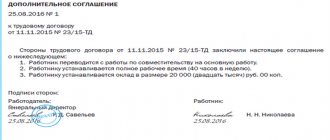In some life situations, employees may have a question about how to quit without working for two weeks. The inability to notify your manager about your departure in advance may be due to a number of valid reasons, such as illness, the need to care for a child, an urgent move, and so on. But sometimes employees want to quit without working, without good reason to do so. Under what circumstances this is possible and in what cases it is not will be discussed in this article.
Employer's consent
If an employee has the opportunity to reach an amicable agreement with his manager, then he can resign without any good reason, even on the day of his application.
As a rule, in such situations, filing an application is preceded by a verbal agreement between the employee and the manager, after which all the necessary documents are drawn up. The employee submits an application that contains a request to dismiss him from a certain date without working off. However, it is not necessary to indicate the reasons for such dismissal. The leader puts his resolution on the statement. And this is documentary evidence of the agreement between the employer and employee.
Natalia
Labor expert
It is important to know! The manager has the right to agree to dismissal without work, in the absence of valid reasons for the employee, but he is not obliged to do this. Therefore, if you receive a refusal from the employer, you will not be able to appeal it in court.
Vacation registration
To avoid processing you can use:
- main leave;
- leave without pay (wages).
If paid annual leave is less than two weeks, then you will have to take leave without pay.
https://youtu.be/WwPnB5l-foU
But to take a vacation at your own expense, you need good reasons. List of reasons mentioned in the labor code:
- disability (Article 128);
- participation in the Great Patriotic War (Article 128);
- studying, passing exams (part-time, part-time, full-time education) (Articles 173, 174);
It is important to note that the employer may refuse legal leave if it was not recorded in these numbers in the leave schedule.
An application for leave along with dismissal is drawn up according to the template of a regular application.
At the top (in the header of the document) the position of the manager (to whom the application is addressed), the name of the company, surname (in the dative case) and initials of the manager are indicated, then we write our position, full name (in the genitive case).
After that the word “Statement” is written.
Below is the application itself with a request for annual paid leave or leave at your own expense, indicating the period, duration and reason for subsequent dismissal. The day of dismissal is considered the last day of vacation. At the bottom of the application is the applicant’s signature, transcript and number.
Sample application for “leave followed by dismissal.”
Gene. Director of Umka CJSC Grinko G.N.
From an assistant accountant
Smirnov Oleg Valerievich
Statement
Please provide me with annual paid leave from 06/01/2015 to 06/14/2015, lasting 14 calendar days, followed by voluntary dismissal.
05/29/2015 Smirnov
In an application for leave without pay followed by dismissal, you must indicate the reason for the need for leave:
I ask you to grant me leave without pay from 06/01/2015 to 06/14/2015, lasting 14 calendar days, due to caring for my seriously ill mother, with subsequent dismissal at my own request.
The application is drawn up either in printed form or written by hand by the employee on A4 sheet. Based on it, two orders of the manager are issued. The first order is about leave, the second is about dismissal.
To take leave at your own expense for a valid reason, you must attach a supporting document.
sample application for “leave with subsequent dismissal” in MS Word format.
Dismissal due to new job
One of the most common reasons for leaving is the search for a new job on more favorable terms. At the same time, an agreement with a new employer on employment in itself is not a valid reason for dismissal without service. In this case, the employee must notify about his dismissal in advance. The same applies to dismissal by transfer.
In practice, quite often, in a letter of resignation by way of transfer, employees ask to be dismissed without working. At the same time, dismissal by transfer is also not a valid reason why the manager is obliged to dismiss his employee on the date specified in the application. A letter of request from a new employer guarantees the employee employment within a month. This means that work in this situation does not violate his rights, and, therefore, remains at the discretion of the employer.
What good reasons allow you to quit without working?
Art. 80 of the Labor Code of the Russian Federation contains an open list of such reasons, citing only two of them as examples:
- Retirement (regardless of the period that has passed since its registration);
- Admission to a university or other educational institution.
Natalia
Labor expert
The Resolution of the Plenum of the Armed Forces of the Russian Federation supplements this list, indicating that the reasons why an employee cannot continue to work and must be dismissed at a time convenient for him is the sending of his legal spouse abroad, to a new place of service.
In practice, the reasons why the courts recognize the requirement for dismissal without service as legal include:
- Employee health problems;
- The need to care for a sick child or other family member;
- Urgent relocation and so on.
It might be interesting!
Can a pensioner resign without working?
Do I have the right not to work?
There are cases when an employee may not work, but they are quite arbitrary. For example, people often find out about retirement or moving in advance, which means you can warn your boss some time before leaving so that he has time to take action and find a replacement for you, as well as prepare documents and calculations. The official reasons for dismissal without two weeks of work are:
- Retirement. Whether a pensioner leaves on time or works in retirement and suddenly decides to leave, he has the right not to work.
- Moving to another city or country for permanent residence
- Relocation due to the transfer of a spouse to a new workplace in another city or country
- Violation of the terms of the employment contract by the employer
- Enrollment in an educational institution
If your boss has violated the terms of the contract, you do not need to leave immediately until the violation is established. Failure to show up for work within the two-week period will be regarded as absenteeism, which means you can be fired not at your own request, but under the article. There are other reasons that may be considered valid. But since they are not specified in the Labor Code of the Russian Federation, the decision will depend on the employer himself and the authorized bodies. What other reasons could there be?
- If you are sick and the illness prevents you from continuing to work
- If you have been selected for a competitive position
- If you are called up for military service
- If you need to care for a child under 14 years of age or a disabled child under 18 years of age
- If other family members need care
- If you are pregnant and want to quit
- If the company you work for is liquidated.
- If you are fired due to reduction
Dismissal due to responsibilities for caring for a child under 14 years of age
Women with children find it quite difficult to combine work with childcare. That is why the law provides certain guarantees to such women. For example, providing the opportunity to work part-time, reducing the grounds for dismissal at the initiative of the employer, etc.
At the same time, the Labor Code of the Russian Federation does not directly indicate such grounds as a reason for dismissal without service. Therefore, if a woman has an urgent need to resign on this basis, she needs to draw up a statement and indicate in it:
- A request to fire her without work;
- Desired date of dismissal;
- The reason why the need for child care arose.
The application must be accompanied by a copy of the child’s certificate, as well as other documents confirming the woman’s inability to continue working for this employer (for example, a medical report, a death certificate of another relative who previously helped with child care, and so on).
An employer's refusal to dismiss a woman on the date specified in her application can be appealed in court.
Timing and essence of “working off”
The term “working off” does not exist in labor legislation. Its origin is explained by the conclusions drawn from reading Article 80 of the Labor Code of the Russian Federation regarding an employee’s warning to management no later than two weeks before the event if they want to separate. In general, the working period due to the above formulation is the notorious two weeks. However, the article makes a reservation for other periods provided for by law.
At the request of the employee, the period of compulsory work is reduced to three days upon dismissal:
- during the probationary period when the employee has concluded that this work is uninteresting (paragraph 4 of Article 71 of the Labor Code of the Russian Federation);
- when concluding a fixed-term employment contract for a period not exceeding 2 months, for early termination (Article 292 of the Labor Code of the Russian Federation);
- when involved in seasonal work to terminate an individual contract (Article 296 of the Labor Code of the Russian Federation).
The legislation increases the working period to a month for the following categories of resigning persons:
- the first person of the enterprise, since the period for searching for a replacement increases (Article 280 of the Labor Code of the Russian Federation);
- coaches or professional athletes when concluding an employment contract for a period exceeding four months (Article 348.12 of the Labor Code of the Russian Federation).
The maximum specified time required for finding a replacement, accepting and transferring cases and introducing a new specialist to the course can be reduced to dismissal in one day by agreement with management. The legislation provides for working off in order to avoid disruptions in the financial, production and economic activities of the enterprise. The employer has the right to dismiss at his own request within 1 day.
Dismissal due to relocation of spouse
Another valid reason for dismissing an employee on his own terms may be the relocation of the employee’s legal spouse to another region or abroad for work or service. This explanation was given by the Supreme Court of the Russian Federation in the Resolution of the Plenum of March 17, 2004. No. 2.
If an employee experiences such a situation, he must immediately submit an application at his place of work. The application must be accompanied by documents confirming the need for relocation, including:
- Documents from the place of work of the legal spouse;
- Marriage certificate;
- Copies of airline tickets and so on.
Dismissal during vacation
Quite often, employees use the option of dismissal after vacation. This is a good opportunity to comply with the two-week work requirement without physically being at the workplace.
The law does not prohibit an employee from writing a letter of resignation before or during vacation, however, it prohibits employers from dismissing personnel during their vacation (Article 81 of the Labor Code of the Russian Federation).
It is worth noting that this option is suitable for those employees who have the opportunity to take vacations at any time of the year, and not, for example, according to the vacation schedule.
The right to dismissal granted by the Labor Code of the Russian Federation to pensioners
The law expressly provides that the employer is obliged to sign the employee’s application without the need to work if he has retired. At the same time, it does not matter how long has passed since the employee retired. The right to dismissal at a time convenient for the pensioner remains with him until the end of his life.
A pensioner can confirm his status with a certificate from the pension fund.
It might be interesting!
Can a woman be fired on maternity leave?
Features of dismissal after two weeks of work
Russian legislation establishes that an employee, having made a decision to dismiss, must notify the employer of his decision two weeks before the date of termination of the employment contract.
The peculiarity of calculating the two-week period is that it is calculated not from the date the application is written or signed by management, but from the next day. It does not matter whether this day is a working day or a weekend.
The fourteen-day period includes calendar (not working) days. The employer cannot increase the working period, regardless of the reasons. He only has the right to terminate the employment contract with the employee at the initiative of the latter.
It is important to remember that the employee should not perform a labor function during the two weeks in question. His responsibilities include only notifying the employer of his decision. There are a number of cases when an employee must wait until the end of the two-week period without working. There are also cases in which the employer is obliged to release an employee before the deadline established by law.
Dismissal due to sick leave
A deterioration in health, resulting in the impossibility of further continuation of work, is an unconditional basis for the dismissal of an employee on the date specified by him. To ensure that the employer has no doubts, copies of medical reports must be attached to the application.
In addition, you can quit without working while on sick leave if the duration of the sick leave is equal to or more than two weeks. The Labor Code of the Russian Federation does not contain the concept of working off as such. The law states that you must notify management of your departure 2 weeks in advance. And if the employee is on sick leave for all of these 2 weeks, the employer will still be obliged to fire him upon expiration of the established period.
By the way! You can quit without working while on vacation. The main thing is that it is equal to or exceeds a two-week period.
Alternative options
An employee who does not want to work a two-week period has the right to write an application for leave with subsequent dismissal. The second option is to submit a second one after writing the application - for vacation. In this case, the employer will not be able to get the employee to work off.
Some employees who do not want to be fired early go on sick leave. It's also legal.
If an employee believes that he has a valid reason for terminating his employment without working off, but the employer does not let him go, the employee has the right to go to court with a complaint against the organization.
The most convenient option is to contact the employer with a proposal - not to bring the matter to court. Since the legal process can drag on for several months, organizations most often make concessions.
It is possible to terminate an employment contract without working out. To do this, you need to come to an amicable agreement with the manager or provide the boss with documents about the existence of valid reasons for early dismissal.
https://youtu.be/ZiQE_2MnTmw
Your rating of the article










